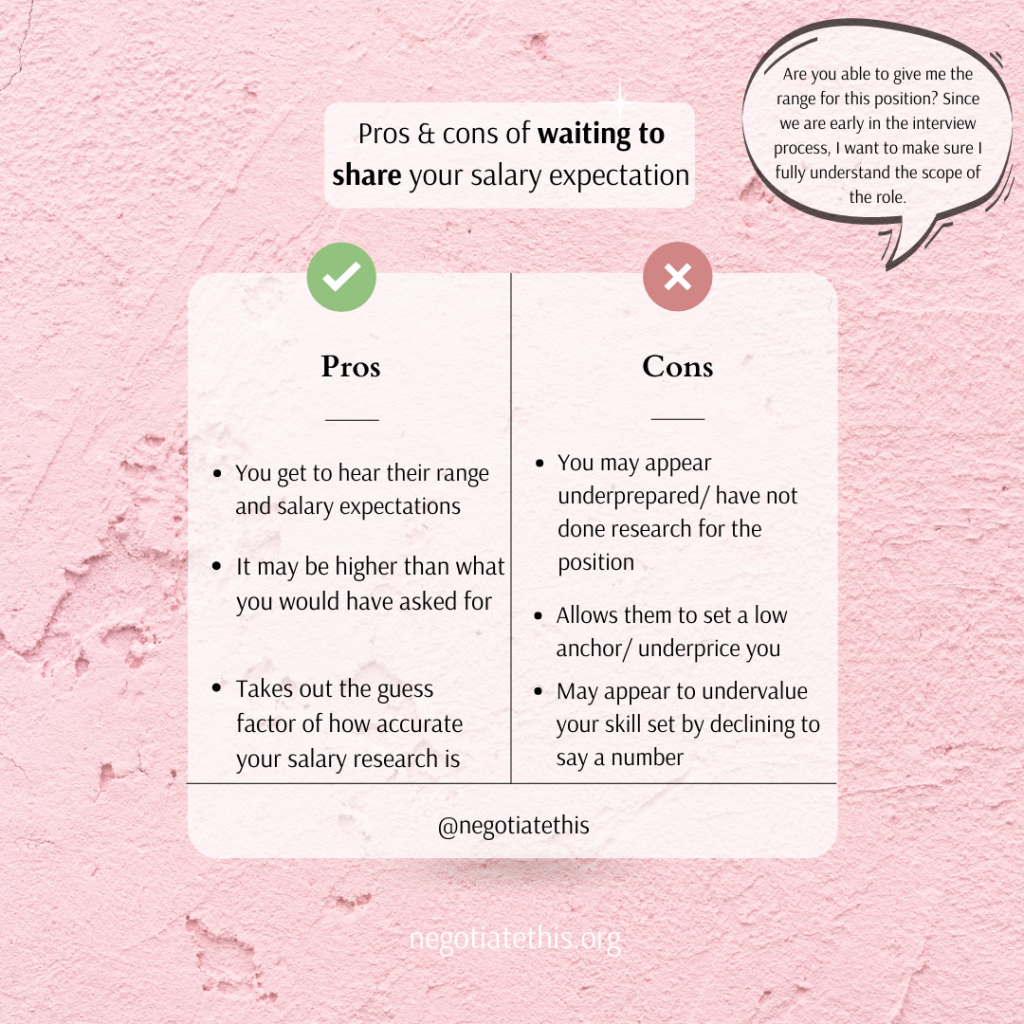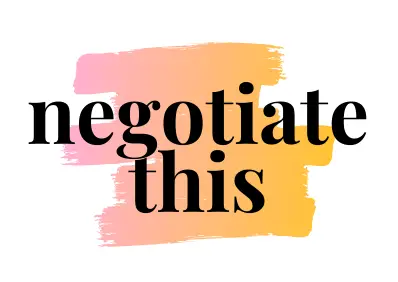Have you ever felt uncomfortable with the question “What are your salary expectations?” It can feel tricky. It can be difficult to know what to say. How you respond is based on how much information you have, how confident you feel with that information, and the unique circumstances of the situation.
Your two options depend on the following:
- Option #1 – You Have Your Number Ready
- Option #2 – You Don’t Want To/ Know How to Answer Yet
You know which option is best for you. Read on to find out which one you prefer.
Option #1: You Have Your Number Ready
The first option is when you have your number ready for the question, “What are your salary expectations?” When you share first, this means you have a thorough understanding of the position and know how much to ask for with confidence.
Maybe you have been in the organization for a while so you know what to ask for and what they offer. Potentially you know people and their pay. Maybe you have been around the industry since you were a kid. This is when you get the opportunity to say exactly what you want.
In this scenario, you not only have your number ready, you have your 3 numbers ready. What 3 numbers? Check out the blog post 3 Numbers You Need to Have Ready When Negotiating.
Your 3 numbers:
- Asking price
- Desired price
- Walk away price

The asking price (or the number you are going to tell them) is higher than the price you actually want. Aim high. Higher than you think. Ask for a higher price than you want so that within the negotiation process, when/if you are negotiated down, the amount is still within your sweet spot.
Ask for more than you think you should. It shows you’re confident in your skills and you’re worth it. Confidence is hard to turn down.
What to Say When You Have Your Number Ready
Interviewer: “What are your salary expectations?”
You: “Based on my market research and the value I bring, I am looking for $X.”
Want to say a range?
You: “Based on my market research and the value I bring, my range is $X (number AT or ABOVE what you want) – to $Y.”
Option #2 – You Don’t Want To/ Don’t Know How to Answer Yet
Maybe you don’t feel ready to share your salary research or you aren’t exactly confident in it. Maybe you feel like you will get a better offer if they share first. This may be the case if you are new to the industry and don’t feel like you have a true handle on the pay ranges. Maybe you want to ensure they don’t try to get you to give a lower number by going first.
What to Say When You Don’t Want To/ Know How to Answer Yet
Interviewer: “What are your salary expectations?”
You: “Are you able to give me the range for this position? Since we are early in the interview process, I want to make sure I fully understand the scope of the role.”

Pros & Cons of Sharing and Waiting to Share
There are pros and cons to each of these methods. You have to ultimately decide what is best for your situation. Do you know a lot about the position or a little? If you know a lot about the position, sharing your number or range first could be the best option. With this scenario, you feel confident that you will be able to give a high anchor, higher than one they will give.

Pros & Cons of Sharing Your Number
What to say: “Based on my market research and the value I bring, my range is $X (number AT or ABOVE what you want) – to $Y.”

Pros:
- Allows you to set a high anchor/ number in the negotiation
- Shows you researched and are prepared
- Demonstrates confidence your value
Cons:
- It may be too low
- It may be too high
- You may appear out of touch if your range is too far off
Pros & Cons of Waiting to Share Your Number
What to say: “Are you able to give me the range for this position? Since we are early in the interview process, I want to make sure I fully understand the scope of the role.”

Pros:
- You get to hear their range and salary expectations
- It may be higher than what you would have asked for
- Takes out the guess factor of how accurate your salary research is
Cons:
- Allows them to set a low anchor/ underprice you
- You may appear underprepared/ have not done your research for the position
- May appear to undervalue your skill set by declining to say a number
Always Be Ready To Name a Number
“Assume that at some point in the interview process, you might get asked what salary range you’re looking for. There’s a lot of advice out there recommending that you duck the question and respond with something like, “I’m seeking a fair salary that’s in line with the market” or “I’d like to learn more about the job and your benefits package before I answer that.” But I’ve got to tell you — an awful lot of interviewers aren’t going to let those answers stand. You’re very likely to get pushed to name a number, because employers don’t want to waste their time if you’re wildly outside of their ballpark” (Green, 2019).

Sometimes you just have to make the first offer. “It’s still very, very common for companies to play coy and insist you name a number first” (Green, 2019). This is when all your hard work and research comes into play. You’ve done your job and researched the market value, geographic market value, you have a range, and you’ve asked around to get a reference point from real people.
“You can try saying, “Can you tell me what the range for the position is?” And some interviewers will tell you, so it’s worth asking. But in other cases, you’ll need to be prepared to name a number yourself if you want to move forward in their process” (Green, 2019). If you’re pressed to name the range you have in mind, one option is to say, “I’m still learning about the job, of course, but based on what I understand so far, I’d be looking for a salary in the range of $X–$X. Are we in the same ballpark?” (Green, 2019).
Research on Anchors
Don’t be afraid to make the first offer. If you have done your due diligence of researching, you likely have a good understanding and therefore you can set a high anchor.
Check out the article Can I Make the First Offer in a Negotiation? to read more about anchoring and naming the number first.
Making the first offer can leave you feeling like you potentially left money on the table, but this is not as likely as you think. “Research on the anchoring bias has shown that negotiators may be able to gain an edge by making the first offer and anchoring the discussion in their favor” (Harvard Law, 2020). This is why the negotiation tip of doing your research can never be overstated.
Which Do You Prefer?
Which do you prefer? There are pros and cons to both.
Do you prefer to give the number first or have them share? Do you see other pros and cons to each option? Comment below!

Sources
*Article: “How to Negotiate Salary After a Job Offer: 6 Tips to Get More Money” @thecut
Author: Alison Green (2019)
*Article: “What is Anchoring in Negotiation? Learn How to Defuse the Anchoring Bias and Make Smart First Offers” (2020) @harvardlaw, Harvard Law
Author: Katie Shonk
Want More on Negotiation?
If you want weekly motivation and negotiation tips, sign up for blog posts and for daily inspiration follow @negotiatethis on Instagram. You got this. All you need is a little negotiation inspiration!
Want more negotiation tips? Check out these posts to help you in your next negotiation:
- 7 Steps to Take When You Find Out You’re Underpaid
- What Are the Best and Worst Methods for Negotiating?
- Top 5 Negotiation Tips for a Smoother Negotiation
- 3 Powerful Negotiation Tips No One Tells You
- 3 Easy Steps to Promote Yourself in a Negotiation
- 4 Important Questions You Need Answered Before Your Negotiation
- 3 Tips: Find the Numbers to Emphasize Your Valuable Contributions
- 6 Important Items to Think About When Asking for More
- When You Negotiate Make Sure You Complete These 8 Items

Disclaimer: While the contents of this post and blog come from research and personal experience, each experience, situation and/or person has their own unique circumstances. This is not negotiation, financial or any other form of legitimate or official advice from an expert. Each individual should do their own independent, comprehensive research. Negotiation, career and all other decisions are the sole responsibility of each individual or party. Details found on the blog and in individual posts are opinions and should be treated as such for entertainment purposes only. Read further disclaimer information in the footer and on the Disclaimer page.
